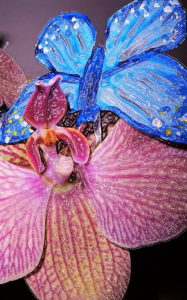How to recognize outward body signs of hypothyroidism
Outward body signs are not used for a definite diagnosis of a health condition but they can tell us a lot about the state of our body. A sign of an illness is always there somewhere on the outside.
Hypothyroid people experience many negative health issues such as tiredness, overall weight gain, muscle and joint pain, headaches and varied levels of depression. However the outward appearance is also a good indication of a low thyroid hormonal state or problems with the functioning of thyroid hormones.
Changes or abnormalities in eyes, skin, hair and nails and general appearance of a person can be signs of hypothyroidism and the degree of changes also relates to the severity of the illness.
The outward signs of hypothyroidism are connected to a changed functioning of many organs and nutritional deficiencies as thyroid hormones deficits affect every cell in the body. Thyroid hormone directs metabolism and production of proteins (such as keratin in your skin, nails and hair).
I will therefore also explain the outward changes in relation to nutritional deficiencies, stress and other organ functions which can be affected by a low thyroid function.
Some health practitioners read eyes, their iris and white area. I will not go into eye diagnosis as iridology and sclerology knowledge is a complex science of its own. A health practitioner had once read my irises and at the time, diagnosed me with severe magnesium deficiency and tight muscles. Her reading was accurate.
Let’s start on what you can see with hypothyroidism. Of course, the outward signs may be individual and not all are experienced by everybody. The appearance changes can be very mild or more dramatic.
Hair– losing about a small ball of hair every day, hair is thinned out especially in the front. It appears lifeless, without a shine, can be normal or coarse and brittle.
Why?
Loss- Low thyroid, other hormonal deficits, possible deficiencies of vitamin B2, B3, B5, B6, B7, B12, inositol, D, A, C, sulphur, biotin, zinc, iodine, selenium, calcium, magnesium, low iron stores, taurine, essential fatty acids, bile insufficiency, adrenal insufficiency, autoimmunity problems (Alopecia- more patchy and severe hair loss when compared with hypothyroidism)
Thin, lifeless- low thyroid, iron and biotin (B7) deficiency
Brittle- sulphur deficiency
Face– puffy looking (varying degrees), pale, lifeless, swelling under eyes especially in the morning, ‘bags under eyes’, double chin, swelling in the upper cheeks, looking older and more tired.
Why?
Low thyroid, lowered kidney glomerular filtration rates, accumulation of toxins, deficiencies in nutrients
Eyes– look tired, kind of lifeless without a spark, may be dry, rarely may have an uneven appearance, some people may have some puffiness on the eyelids, dark circles under eyes, redness around the eyes, poor night vision and pale inner lower eye lids skin
Why?
Apart from hypothyroidism contributing factors are:
Dark circles under eyes- food intolerance, allergies, adrenal weakness, iron deficiency, lack of sleep, stress. Some of the causes of iron deficiency can be copper deficiency (makes iron unavailable), stress, autoimmunity and heavy menstrual bleeding.
Bags under eyes- allergies, food intolerance, toxin accumulation in the body, low iodine.
Dry – Vitamin A and/or vitamin D deficiency
Redness or cracking at the outer angle of the eyes- Vitamins B2 or B6 deficiencies
Pale inner lower eye lids skin- anemia (iron deficiency)
Poor night vision –vitamin A deficiency
Eyebrows- may be thinning with 1/3 of outer eyebrows lost
Beard- thinning
Why?
As for hair
Lips– may crack, peel, feel dry and look pale
Why?
Apart from a low thyroid, low iron and B12 vitamin (common with hypothyroidism), vitamin B2 deficiency, thrush, sugar balance problems (also connected to hypothyroidism)
Bleeding gums
Why?
Low thyroid, vitamin C deficiency
Mouth– may feel dry
Why?
Low thyroid, possible iron deficiency, vitamin B2 deficiency, sugar balance problems and dehydration.
Tongue– swollen with lateral teeth indentations (scalloped tongue), may have some white coating on it.
Why?
Hypothyroidism, inflammation, poor fluid flow and stagnation, vitamin B2 deficiency, allergies, not enough nutrients in the body, low protein, poor stomach acid, unhealthy gut, stress, anxiety, some other diseases or conditions and dehydration.
Light white coating – poor circulation in extremities, poor stomach acid and indigestion.
Neck– goitre possible
Why?
Iodine deficiency, selenium deficiency, autoimmunity
Hands– may be swollen (it is hard to take a ring off), cold and dry, swelling of fingers is related to low vitamin B6 and swelling generally related to a reduced kidney filtration rates and accumulation of toxins. Carpal tunnel syndrome may be a problem with hypothyroidism (also connected to vitamin b6 deficiency).
Heals
Cracked and rough
Why?
Low thyroid
Nails– thin, brittle, have pits and grooves, splitting, grow more slowly and may have some deformities, they usually have longitudinal (vertical) ridges, cuticles can be jagged with rough edges, lack of lunula (the white half-moons) on most fingers (connected to slow metabolism, also connected with low iodine and anemia- iron or vitamin B12 deficiency). Healthy people should have white, good lunulas.
It is traditionally believed that pronounced vertical ridge formation on the nails relates to a low thyroid, a possible weakness in the digestive tract that results in compromised assimilation of nutrients (leaky gut, food sensitivities, poor digestion), common with increasing age (most likely due to a poorer digestion), may also relate to selenium deficiency, often a zinc and vitamin B deficiencies.
Apart from hypothyroidism, other related deficiencies may be present that change the appearance of the nails.
Rough cuticles – biotin, zinc deficiency
Brittle nails that split easily may also indicate a fatty acid, protein, vitamin A deficiency, iron or calcium deficiency and a low stomach acid.
Soft/brittle nails: may be a magnesium deficiency or iron deficiency
Brittle nails generally- apart from hypothyroidism, fatty acid deficiency, biotin, vitamin A, iron, sulphur, magnesium or calcium deficiencies
Nails with white flecks or lines may result due to a zinc or vitamin B6 deficiency.
Excessively dry nails may be due to a Vitamin B12 deficiency
Slow growing, dry nails- may be indicative of a vitamin A or iron deficiency
Beads that appear to drip down the nail like wax -vitamin B deficiencies
Brown-grey fingernail and toenail discoloration- possible vitamin B12 deficiency
Small depressions (grooves) in a nail- iron deficiency
Curved upwards- severe iron deficiency
Skin– dry, pale, thick, cold, puffy face, can have rough scales and yellowish appearance (especially on the palms and soles), swelling may be present in extremities (hand, fingers, swollen ankles, feet and face), skin may bruise easily, be itchy, sweat less and wrinkle. Some people notice an increase in acne or dry lichen like patches on their skin.
Why?
Hypothyroidism causes dryness by decreasing the function of sebaceous and sweat glands. Pallor is related to a decreased skin blood flow and anemia (iron and vitamin B12 deficiency are common). Pink urine after eating beetroots may be an indication of low iron. Yellow skin tint is connected to the deposition of carotene as the conversion of carotene to vitamin A is slow with hypothyroidism. Dry, scaly and flaking skin – apart from low thyroid, contributing factors are low vitamin A, D, fatty acids, zinc, potassium and dehydration. Swollen ankles may also relate to a low vitamin B1 caused by malabsorption due to hypothyroidism. Tingling, Prickling, and Numbness in in hands and feet can also relate to B-vitamin deficiency (particularly folate, B6, B5 and B12) and minerals such as calcium and phosphorous. Bruising- low thyroid, low vitamin C and other problems.
Muscles
Tender calf muscles – magnesium deficiency
General appearance: tired and bloated
Why?
Low thyroid causes fluid retention and poor sleeping.
General recommendations to consider with hypothyroidism:
Make sure your thyroid function and thyroid hormonal replacement are optimal.
Consider adding Natural Desiccated Thyroid to levothyroxine hormonal replacement
Check your nutritional profile (vitamin B12, iodine, zinc selenium, magnesium, calcium and iron)
Improve stomach acid with apple cider vinegar (in some water before the main meal) and Betaine –HCl (only for those diagnosed with a low stomach acid)
Consider adding vitamins B to your diet (I personally use Brewer’s yeast)
Consider adding plenty of natural vitamin C (I personally use Acerola cherry powder)
Good adrenal support herbs (such as those containing Rhodiola rosea)
Reduce stress
Rest adequately
Optimize your nutrition (lots of green leafy greens, healthy varied diet with essential fatty acids)
Please note this blog is for educational purposes only. Please contact your doctor if you are worried about any outward changes in your appearance. Changes in skin, hair, nails and eyes may be connected to other illnesses apart from hypothyroidism.
I welcome any comments and personal stories you might want to share to help others.

